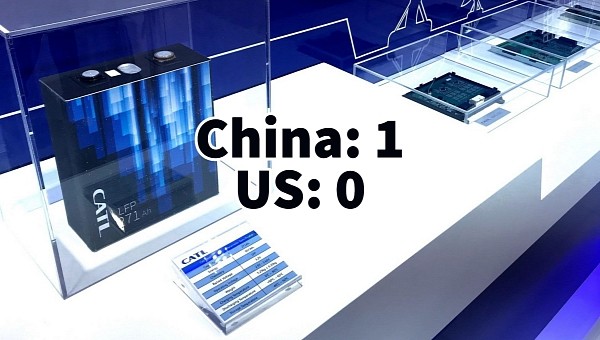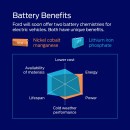Tesla is looking to build a new battery plant in the U.S. to make LFP batteries using CATL technology. The EV maker follows Ford, which made a similar announcement in February. CATL is the biggest EV battery manufacturer in the world and a big supporter of LFP chemistry.
Lithium-Iron-Phosphate (LFP) batteries are set to dominate the EV market in the coming years thanks to their affordability, endurance, and safety. Tesla uses them for the base-version Model 3 and Model Y, whose very competitive prices are a direct result of utilizing LFP cells. Unfortunately, LFP cells are mostly made in China for the time being, and this is a problem in light of the Inflation Reduction Act (IRA). Because of that, Tesla loses the full tax credit on the most affordable Model 3 in the U.S. (LFP-powered Model Y is not sold here).
The solution is to build an LFP battery factory in the U.S. and benefit not only from the IRA tax credits offered to EV buyers but also from the incentives offered to battery manufacturers. Ford was the first U.S. company to announce such a move in February. Ford licensed the technology from CATL but kept the factory under its control, and this still wasn't enough. If you recall, one of the main drives behind the IRA was to reduce reliance on the Chinese battery production chain, and building a factory with CATL doesn't do it justice.
Ford is yet to appease critics on its move, but Tesla is already following close with its own CATL-backed LFP battery factory. According to Bloomberg, Tesla has been talking to White House officials about plans involving Contemporary Amperex Technology (CATL). The EV maker sought clarity on the Inflation Reduction Act rules before the IRS finalized them this week. Tesla wants to pursue a deal similar to the one Ford announced last month. This means the factory would be wholly owned by Tesla, and the EV maker would license the LFP technology from CATL.
Tesla is considering building the battery plant in Texas (reading this article requires subscription) as it will have to supply Giga Texas with LFP cells. A location has not been determined yet, although Tesla wants to have its supply chain as closely integrated with its gigafactories as possible. Based on this, we figure the new battery factory would be built adjacent to Giga Texas. This is already happening at Giga Nevada, where Tesla is building a 4680-cell manufacturing facility next to the Tesla Semi production line.
The LFP chemistry is slowly becoming dominant as more carmakers see its benefits. It may not have the highest energy density, but being cheap to produce makes LFP cells ideal for entry-level electric vehicles. LFP batteries have a longer lifecycle than ternary cells and are far less likely to overheat and burst into flames when tampered with.
The switch to LFP cells will also deal a blow to Korean battery makers, which favor NMC and NCA chemistries. Besides Ford and Tesla, Volkswagen and GM have also announced plans to adopt LFP cells for their electric vehicles. GM recently canceled plans to build its fourth battery-manufacturing facility with Korea's LG Energy Solution.
The solution is to build an LFP battery factory in the U.S. and benefit not only from the IRA tax credits offered to EV buyers but also from the incentives offered to battery manufacturers. Ford was the first U.S. company to announce such a move in February. Ford licensed the technology from CATL but kept the factory under its control, and this still wasn't enough. If you recall, one of the main drives behind the IRA was to reduce reliance on the Chinese battery production chain, and building a factory with CATL doesn't do it justice.
Ford is yet to appease critics on its move, but Tesla is already following close with its own CATL-backed LFP battery factory. According to Bloomberg, Tesla has been talking to White House officials about plans involving Contemporary Amperex Technology (CATL). The EV maker sought clarity on the Inflation Reduction Act rules before the IRS finalized them this week. Tesla wants to pursue a deal similar to the one Ford announced last month. This means the factory would be wholly owned by Tesla, and the EV maker would license the LFP technology from CATL.
Tesla is considering building the battery plant in Texas (reading this article requires subscription) as it will have to supply Giga Texas with LFP cells. A location has not been determined yet, although Tesla wants to have its supply chain as closely integrated with its gigafactories as possible. Based on this, we figure the new battery factory would be built adjacent to Giga Texas. This is already happening at Giga Nevada, where Tesla is building a 4680-cell manufacturing facility next to the Tesla Semi production line.
The LFP chemistry is slowly becoming dominant as more carmakers see its benefits. It may not have the highest energy density, but being cheap to produce makes LFP cells ideal for entry-level electric vehicles. LFP batteries have a longer lifecycle than ternary cells and are far less likely to overheat and burst into flames when tampered with.
The switch to LFP cells will also deal a blow to Korean battery makers, which favor NMC and NCA chemistries. Besides Ford and Tesla, Volkswagen and GM have also announced plans to adopt LFP cells for their electric vehicles. GM recently canceled plans to build its fourth battery-manufacturing facility with Korea's LG Energy Solution.







